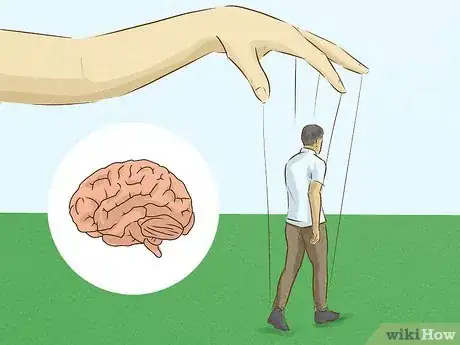This article was co-authored by Jin S. Kim, MA and by wikiHow staff writer, Janice Tieperman. Jin Kim is a Licensed Marriage and Family Therapist based out of Los Angeles, California. Jin specializes in working with LGBTQ individuals, people of color, and those that may have challenges related to reconciling multiple and intersectional identities. Jin received his Masters in Clinical Psychology from Antioch University Los Angeles, with a specialization in LGBT-Affirming Psychology, in 2015.
There are 10 references cited in this article, which can be found at the bottom of the page.
This article has been viewed 57,052 times.
Mind games are never fun, especially if you're dealing with a toxic partner, professional associate, or relative. Essentially, mind games are manipulative tactics that can make you doubt your thoughts and feelings. These psychological tricks might seem difficult to identify at first, but they’re actually pretty easy to spot once you know what to look for. Then you can address the issues head-on and put some distance between yourself and the person playing mind games with you.
Steps
Standing up for Yourself
-
1Speak honestly about how you’re feeling and see how the person reacts. Make the first move and let your partner know you’ve been feeling, and how their actions and words have hurt you. Wait and watch for a specific response—if they seem genuinely repentant and sorry, then you may have been a victim of miscommunication, not mind games. If the person tries to twist your feelings or manipulate the conversation, then you can see the type of person they are.[1]
- For instance, you can say something like, “I feel like you disregard my feelings whenever we have a conversation. I never truly feel heard when I’m speaking with you.” If the person tries to dismiss your feelings, you can know for sure that they’re playing mind games.
- A toxic response might be something like, “How am I supposed to know how you’re feeling?” or “You’re always so moody all the time.”
- It's important to get into the habit of expressing your feelings honestly. Healthy communication is probably the most important aspect of building and maintaining healthy relationships.[2]
-
2Call them out by addressing their games directly. Mind games can involve a lot of toxic, threatening language that the manipulator expects you take sitting down. Try and turn the conversation on them, so they’re put on the hot seat. Ask questions that really put their manipulative language under a microscope, so they’re forced to take accountability for their actions.
- For instance, you can say something like, “Do I have a say in this decision?” or “Are you asking my permission or just telling me?”
Advertisement -
3Allow awkward moments of silence so the person can consider their words. Don’t dread moments of awkward silence within the conversation. Instead, use these moments to your advantage. If the other person tries to play verbal mind games with you, press pause on the conversation and let their words sink in. You may be able to smoke out the individual and expose their manipulation.[3]
- For instance, if the other person makes a comment like, “You’re so moody” or “You’re being overemotional,” simply say nothing at all. This may create enough discomfort for the other person to acknowledge that what they said was wrong.
-
4Imitate the other person’s body language to get on even ground. Take a look at how the other person is standing or sitting, and what kind of body language they’re using. A little trick you can try is “mirroring” that person, which can help you feel more comfortable in a potentially toxic situation.[4]
- For instance, if the other person is standing up straight with their arms crossed, consider crossing your arms as well.
- Don’t overdo it—you don’t want to mimic their every movement. The goal is to show that you’re on the same level as the other person.
- It can be easy to feel submissive and not at the top of your game when the other person has a height advantage over you. Straighten your back and try to sit in a higher position, which can take away the psychological advantage from the other person.[5]
Caring for Your Mental Health
-
1Keep a distance from the manipulative person. Unfortunately, conversations can’t always fix everything. Take a step back from the person in question if they’re consistently manipulative and trying to play mind games. Don’t talk or spend time with this person unless you truly need to.[6]
- You can say, “I don’t appreciate the way you’re speaking to me and dismissing my feelings. If you’re not going to respect how I feel, then I’m going to leave this conversation.”
- Ending any relationship is uncomfortable and sometimes necessary. Once you've identified that a relationship is toxic, it's usually best to end it.[7]
-
2Create a plan of action to escape from the mind games. Mind games are really tricky to deal with, even after you’ve stood up for yourself. Try to separate yourself from the manipulator little by little, whether it’s saying no, or creating clearer boundaries for yourself. Slowly remove that person’s influence from your life, so you can feel happier and more in control.[8]
- For instance, if you live with a parent who constantly plays mind games, it may be worth getting your own place.
- A truly loving relationship won’t involve any mind games.
-
3Talk with a therapist if you’re in a manipulative relationship. It can be really difficult to manage manipulative relationships, especially with a partner. Schedule an appointment with a therapist and see if they can offer any coping techniques. They may be able to provide some clarity, and help you figure out the best solution for your particular situation.[9]
Spotting Mind Games
-
1Watch out for people who make you question your thoughts and feelings. Above all else, mind games often involve a little psychological warfare, and are centered around manipulation. Disqualification involves someone dismissing your feelings completely, while gaslighting is when someone makes you question your sense of reality. If you feel like a person in your life is doing this to you, then you may be an unwilling participant in mind games.[10]
- For example, disqualifying your feelings could be someone saying something like, “You’re so sensitive” or “You’re so gullible.”
- Let’s say your partner goes out by himself for long periods of time, so you share your concerns with him. If he says something like “you’re crazy” or “you’re imagining things,” then he’s definitely gaslighting you.
-
2Look out for aggressive behavior. Mind games can be downright hurtful, depending on how the game is played. Shaming involves someone waiting for you to say something “wrong,” which they’ll use to attack and berate you. Persecuting, as the word suggestions, involves intense verbal assault. If you find yourself in angry, upsetting conversations with another person, you may be a victim of persecution or shaming tactics.[11]
- For instance, someone with deep-rooted political beliefs might wait for you to make a comment that “contradicts” their own school of thought. They’ll use this comment to “shame” you and your own way of thinking.
- Persecuting is one of the most obvious and hurtful mind games, and involves another person unleashing their hate and anger on you.
-
3Spot subtle forms of manipulation. Mind games don’t always have to be aggressive—they can often be simple, passive acts designed to fill you with doubt and insecurity. Forgetfulness involves a person forgetting something important to you, like an appointment or a commitment, and then downplaying your reaction. Pretending involves any kind of fake behavior with the intent to manipulate a conversation. If your conversations with another person feel a bit off-kilter or less-than-genuine, you may be suffering from these types of mind games.[12]
- For instance, if your partner forgets your doctor's appointment, they might say something like, “Was it really that important to you?” This is a classic example of a forgetfulness mind game.
- A healthy relationship is one where both people have respect for each other and their boundaries. If you feel that someone regularly disregards your boundaries or makes you engage in activities or situations that you don't feel comfortable in, it may be time to evaluate that friendship.[13]
-
4Watch for signs of someone playing on your fear. A person might try to play mind games with you by playing on your sense of fear, and using this fear to push you in a certain direction. Try not to fall into this trap—instead, take a step back and look at the whole situation instead of just what the person wants you to see. It can be easy to be controlled and misled by your own fear of missing out.[14]
- For instance, someone might say something like, “This is your chance to finally do something for yourself,” or some other comment that suggests you aren’t courageous.
Expert Q&A
-
QuestionHow do I know if a relationship is toxic?
 Jin S. Kim, MAJin Kim is a Licensed Marriage and Family Therapist based out of Los Angeles, California. Jin specializes in working with LGBTQ individuals, people of color, and those that may have challenges related to reconciling multiple and intersectional identities. Jin received his Masters in Clinical Psychology from Antioch University Los Angeles, with a specialization in LGBT-Affirming Psychology, in 2015.
Jin S. Kim, MAJin Kim is a Licensed Marriage and Family Therapist based out of Los Angeles, California. Jin specializes in working with LGBTQ individuals, people of color, and those that may have challenges related to reconciling multiple and intersectional identities. Jin received his Masters in Clinical Psychology from Antioch University Los Angeles, with a specialization in LGBT-Affirming Psychology, in 2015.
Licensed Marriage & Family Therapist In a healthy relationship, both people have respect for each other and their boundaries. If you feel that someone regularly disregards your boundaries or makes you engage in activities or situations you don't feel comfortable in, it may be time to evaluate that relationship.
In a healthy relationship, both people have respect for each other and their boundaries. If you feel that someone regularly disregards your boundaries or makes you engage in activities or situations you don't feel comfortable in, it may be time to evaluate that relationship.
Warnings
- If you’re in a genuinely abusive situation, call a hotline or look for a local shelter where you can stay.[17]⧼thumbs_response⧽
References
- ↑ https://youtube.com/watch?v=lupzqwPXghc&t=1m44s
- ↑ Jin S. Kim, MA. Licensed Marriage & Family Therapist. Expert Interview. 14 May 2019.
- ↑ https://economictimes.com/magazines/panache/five-tips-to-win-at-mind-games/articleshow/49992728.cms
- ↑ https://economictimes.com/magazines/panache/five-tips-to-win-at-mind-games/articleshow/49992728.cms
- ↑ https://economictimes.com/magazines/panache/five-tips-to-win-at-mind-games/articleshow/49992728.cms
- ↑ https://www.psychologytoday.com/us/blog/communication-success/201407/how-recognize-and-handle-manipulative-relationships
- ↑ Jin S. Kim, MA. Licensed Marriage & Family Therapist. Expert Interview. 14 May 2019.
- ↑ https://www.psychologytoday.com/us/blog/lifetime-connections/201507/how-escape-master-manipulator
- ↑ https://www.goodtherapy.org/blog/psychpedia/manipulation
- ↑ https://blogs.psychcentral.com/psychoanalysis-now/2016/01/mind-games-people-play/
- ↑ https://blogs.psychcentral.com/psychoanalysis-now/2016/01/mind-games-people-play/
- ↑ https://blogs.psychcentral.com/psychoanalysis-now/2016/01/mind-games-people-play/
- ↑ Jin S. Kim, MA. Licensed Marriage & Family Therapist. Expert Interview. 14 May 2019.
- ↑ https://www.inc.com/justin-bariso/10-ways-manipulators-use-emotional-intelligence-for-evil-and-how-to-fight-back.html
- ↑ https://blogs.psychcentral.com/psychoanalysis-now/2016/01/mind-games-people-play/
- ↑ https://www.hercampus.com/sex-relationships/7-mind-games-he-plays-how-deal
- ↑ https://www.helpguide.org/articles/abuse/getting-out-of-an-abusive-relationship.htm






































































